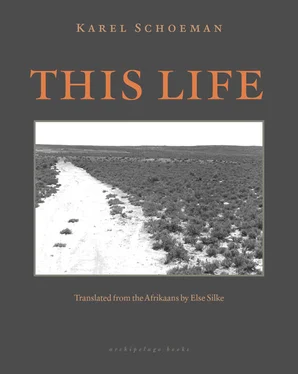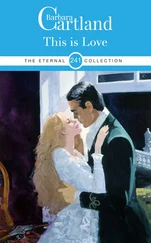Karel Schoeman - This Life
Здесь есть возможность читать онлайн «Karel Schoeman - This Life» весь текст электронной книги совершенно бесплатно (целиком полную версию без сокращений). В некоторых случаях можно слушать аудио, скачать через торрент в формате fb2 и присутствует краткое содержание. Год выпуска: 2015, ISBN: 2015, Издательство: Archipelago, Жанр: Современная проза, на английском языке. Описание произведения, (предисловие) а так же отзывы посетителей доступны на портале библиотеки ЛибКат.
- Название:This Life
- Автор:
- Издательство:Archipelago
- Жанр:
- Год:2015
- ISBN:978-0-914671-16-9
- Рейтинг книги:5 / 5. Голосов: 1
-
Избранное:Добавить в избранное
- Отзывы:
-
Ваша оценка:
- 100
- 1
- 2
- 3
- 4
- 5
This Life: краткое содержание, описание и аннотация
Предлагаем к чтению аннотацию, описание, краткое содержание или предисловие (зависит от того, что написал сам автор книги «This Life»). Если вы не нашли необходимую информацию о книге — напишите в комментариях, мы постараемся отыскать её.
considers both the past and future of the Afrikaner people through four generations of one family. In an elegiac narrator's tone, there is also a sense of compulsion in the narrator's attempts to understand the past and achieve reconciliation in the present. This Life is a powerful story partly of suffering and partly of reflection.
This Life — читать онлайн бесплатно полную книгу (весь текст) целиком
Ниже представлен текст книги, разбитый по страницам. Система сохранения места последней прочитанной страницы, позволяет с удобством читать онлайн бесплатно книгу «This Life», без необходимости каждый раз заново искать на чём Вы остановились. Поставьте закладку, и сможете в любой момент перейти на страницу, на которой закончили чтение.
Интервал:
Закладка:
This must have been the way our land ownership expanded initially and our claim to it was secured, by disputes with the neighbours and threats or acts of violence against those who were weaker than us. Bastersfontein was the first acquisition I can remember and, after that, Kliprug; later there were the purchases and later still, when Maans was a young man, the inheritances, but it started off modestly, yet persistently, and when I reflect on it now, I realise that my early childhood was actually filled with the ongoing blurred arguments about the boundary fences and beacons of Kliprug, where Oom Barend Swanepoel’s herdsmen were reputedly trespassing on our land and had to be driven off forcefully by Jakob and Gert. And once more there is such a sudden, unpleasant recollection of violence, old Oom Swanepoel with his reddish beard, slamming down his fist on the big table in the voorhuis, Mother in her black dress, leaning across the table towards him, both hands resting on the tabletop, shouting at him shrilly, the way she shouted at the farm-hands in the kitchen, and Father sitting between them, helpless or powerless, not trying to intervene in their heated argument while Mother drove the old man from the house with her words as if she were wielding a sjambok. “I won’t be driven away from here like Jan Baster!” the old man shouted over his shoulder in parting, neither could they do it, for he was a white man and they could not simply burn down his house and evict his family, yet in the end he was forced to leave, how, I do not know. “Your grandfather drove to Worcester to get that piece of land,” old Oom Kasper Vlok told Maans at the wedding at Gunsfontein years later, “and I don’t suppose you’re sorry today, are you?” They were discussing Maans’s sheep that were grazing on the land that had been part of Kliprug in the old days, though nobody remembers the name today, and how good the grazing was there; I sat across the table from them and heard the old man’s words, and then I remembered the name Kliprug and suddenly old Oom Swanepoel appeared before me again. I know they conferred by candlelight, Father, Mother and Jakob, and that there were documents on the table that Meester had to come and read to them, so it must have been before Jakob’s wedding, when Meester was still with us. Perhaps they consulted an attorney or the magistrate, or Father might even have had his horse saddled and ridden all the way to Worcester as Oom Kasper had said, for the Vloks lived just beyond Kliprug in those days and he would probably have known. But however it may have been, the Swanepoels likewise disappeared, soundlessly and without repercussion they disappeared, and Kliprug was added to our land as if the disputed boundary fence had never existed.
Mother in her black dress — at the time I did not think about what I had seen or heard, but as I watched her become prouder and more headstrong over the years, I realised how important land and property were to her, and what a high price she was prepared to pay for what she desired, acre by acre, morgen by morgen, and farm by farm. What fired this acquisitiveness that was daunted by nothing and no one, and saw all methods as legitimate? Perhaps that old insecurity and poverty, the bitter youth, the shabby wagon, the worn skin-blankets, the small handful of tin knives and spoons? Could it be that land meant more to her than merely a specific ridge or piece of shrubland or so many fountains, and grazing for so many sheep, and did she see it as a means to everything that had once seemed unattainably distant to her, the power and the status which she finally did achieve, the town house where she hosted visiting ministers, and the seat in the front row at church? I can only try to determine and recognise the pattern; with no hope of understanding it any more.
Thus, since the beginning there must have been a goal, no matter how vague it may have been at first, and a plan, though initially it was carried out rather blindly. At the time I am actually talking about — my childhood years, when I began to take notice of what was happening around me and could remember — it gradually began to take shape, however, around Jakob as the eldest son at first, and later around Maans, his heir; but a goal there had always been, and we children were employed to help achieve it too.
Father could sign his name and read to us from the Bible painstakingly but not much more than that; at the time I can remember, it was mostly Meester who read to us from a Dutch book of sermons on Sundays, and later the task fell to one of the boys, for Meester said the letters hurt his eyes. I never saw Mother with a pen in her hand, neither do I recall her signature anywhere, nor that I ever saw her read, or write even a note. In those years and in those parts there were no schools, and there were few educated people among us; Father and Mother’s contemporaries probably achieved little more than they, and the same went for their children. We had to be educated, however, and when Jakob and Pieter were still young, every effort was made to find schoolmasters for them. Where did Father find these people and how did he retain their services? There was a succession of these tutors, none of whom remained long, and in fits and starts the boys received some kind of education over the years, so that both of them could read and write and do arithmetic; Jakob did not like studying, but Pieter actually had a few old books in which I sometimes saw him read. As I remember, it was always Jakob who was summoned to consult with Father and Mother, yet when a letter had to be written, it was Pieter who had to come, while they sat watching him, dictating what they wanted him to write.
I cannot remember any of these tutors, only the last one that I still knew as Meester. By then Jakob had been confirmed and had stopped taking lessons, but Meester still taught Pieter, and, as he had ample time and no other way of passing it, he taught me a few things here and there in between, though it was not considered one of his duties. I doubt whether Mother really liked it much, but in the end I would have had to get a little education somehow in order to be confirmed, and I cannot remember her ever expressing outright disapproval.
Meester was a Dutchman, and I think that was all we ever found out about him. Dulsie once told us that Father had found him in the Karoo, barefoot in the road with his tin trunk on his shoulder, and had given him a ride out of sympathy and had brought him home to teach the boys, but Dulsie did not think much of Meester and this was not necessarily true, though he did indeed possess a tin trunk. He took his meals with us and before supper in the evenings his feet were washed with ours; yes, and as I have said, on Sundays he read the sermon to us, and I remember how I admired the enthusiasm he brought to the task, even though I did not understand the words in High Dutch. That, however, was as far as he was accepted by the family, for he lived in one of the outside rooms and Dulsie and Gert looked down on him as if they felt he should not be regarded as one of the white people.
The past is another country: where is the road leading there? You can but follow the track blindly where it stretches before your feet, unable to choose the direction in which you want to go. Why am I reminded now of the outside room with its meagre furniture where Meester stayed, and how as a little girl I would sometimes visit him there, and how formally he would welcome me then, as if it were a grown-up who had come to pay him a visit? Of course it was only a game, but to me it meant a lot, and for all I know to him too, for he must have been lonely on that isolated farm among strangers, far from his own country. What we spoke about I no longer remember, though I believe it was probably mostly he who did the talking while I sat listening, wonder-struck and uncomprehending, the way I listened to the sermons he read aloud on Sundays. Sometimes he showed me his books, and I remember some of them had pictures that I found pretty, for in our home there were few books, and pictures were unfamiliar to me. And once he unlocked his tin trunk and brought out a silk handkerchief and showed me what was wrapped inside, and it was something I had never seen before, a black and silver cross so tiny it could fit into the palm of my hand. It is the cross our Lord hung on, Meester told me, and then he wrapped it up again quickly and told me not to mention to Father or Mother that he had showed it to me. What it meant, I did not understand, as little as I understood the secrecy, but the shared confidence was like a bond between us and afterwards, when I visited him in his room, I sometimes asked to see the little cross once more and to hold it in my hand. In our home there were no pictures and no ornaments, and all I had in my youth was Ouma’s brightly-coloured china in the wall-cupboards, the pictures in Meester’s old books, and that tiny cross that I dared not mention, that I could not understand and about which I dared not ask questions. It must have been something Meester had brought with him from abroad that had value or significance to him in his loneliness with us on the farm.
Читать дальшеИнтервал:
Закладка:
Похожие книги на «This Life»
Представляем Вашему вниманию похожие книги на «This Life» списком для выбора. Мы отобрали схожую по названию и смыслу литературу в надежде предоставить читателям больше вариантов отыскать новые, интересные, ещё непрочитанные произведения.
Обсуждение, отзывы о книге «This Life» и просто собственные мнения читателей. Оставьте ваши комментарии, напишите, что Вы думаете о произведении, его смысле или главных героях. Укажите что конкретно понравилось, а что нет, и почему Вы так считаете.












